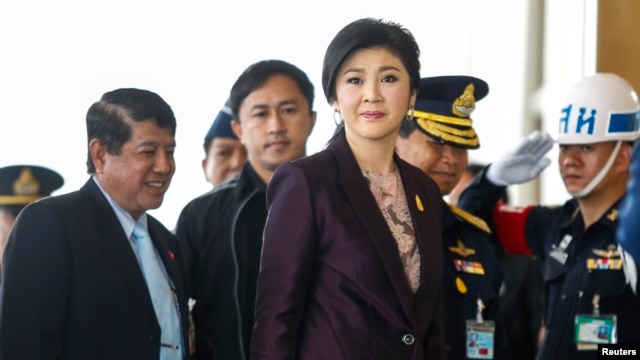
Thailand Prime Minister Yingluck Shinawatra (C) arrives at the Royal Thai Air Force headquarters before a cabinet meeting in Bangkok, Feb. 11, 2014.
Thai officials said they will hold elections in late April for districts where parliamentary voting was disrupted by anti-government activists on February 2.
The Election Commission said the re-run of the vote will take place on April 27, leaving Prime Minister Yingluck Shinawatra in charge of a caretaker government with limited spending powers for at least two and a half more months.
Yingluck called for the snap elections in a bid to end months of protests against her government. But the opposition, which boycotted the vote and blocked many polling stations, have refused to end their rallies.
On Monday, Thai police have arrested a top leader of the anti-government protests.
Police said they arrested Sonthiyarn Cheunruethainaitham on charges of violating Thailand's emergency law.
Department of Special Investigations director-general Tharit Pengdit said police will continue arresting protest leaders who violate the special law. Authorities say arrest warrants have been issued for 19 leaders of Thailand's anti-government protests.
Elsewhere in the Thai capital Monday, hundreds of farmers rallied outside Thailand's Justice Ministry in Bangkok to demand overdue payment for rice sold in a government subsidy program.
The rice subsidy program, along with other populist policies, won the support of farmers, which helped Prime Minister Yingluck Shinawatra's party a landslide election in 2011.
The anti-government protest movement, which is trying to topple the prime minister, is supported by the urban middle class who are angered by what they say is waste and corruption in the rice program.
At least 10 people have been killed and scores hospitalized during the political upheaval. |
|
